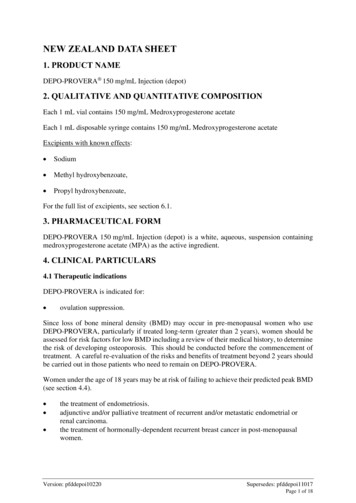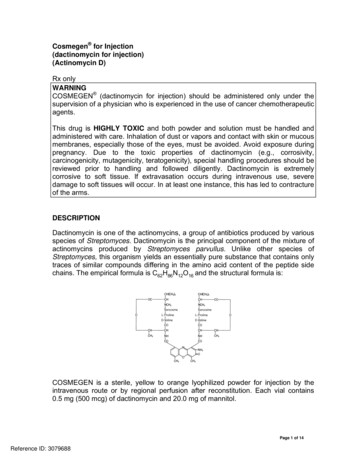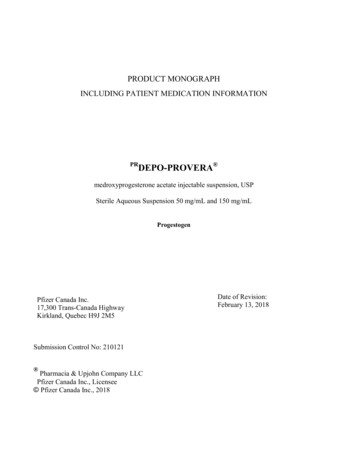
Transcription
DEPO-PROVERA- medroxyprogesterone acetate injection, suspensionPharmacia and Upjohn Company LLC---------HIGHLIGHTS OF PRESCRIBING INFORMATIONThese highlights do not include all the information needed to useDEPO-PROVERA CI safely and effectively. See full prescribinginformation for DEPO-PROVERA CI.DEPO-PROVERA CI (medroxyprogesterone acetate) injectablesuspension, for intramuscular useInitial U.S. Approval: 1959CONTRAINDICATIONSKnown or suspected pregnancy or as a diagnostic test forpregnancy. (4)Active thrombophlebitis, or current or past history ofthromboembolic disorders, or cerebral vascular disease. (4)Known or suspected malignancy of breast. (4)Known hypersensitivity to Depo-Provera CI(medroxyprogesterone acetate or any of its other ingredients). (4)Significant liver disease. (4)Undiagnosed vaginal bleeding. (4)WARNING: LOSS OF BONE MINERAL DENSITYSee full prescribing information for complete boxedwarning.Women who use Depo-Provera Contraceptive Injection(Depo-Provera CI) may lose significant bone mineraldensity. Bone loss is greater with increasing duration ofuse and may not be completely reversible. (5.1)It is unknown if use of Depo-Provera ContraceptiveInjection during adolescence or early adulthood, acritical period of bone accretion, will reduce peak bonemass and increase the risk for osteoporotic fracture inlater life. (5.1)Depo-Provera Contraceptive Injection should not beused as a long-term birth control method (i.e., longerthan 2 years) unless other birth control methods areconsidered inadequate. (5.1)RECENT MAJOR CHANGESDosage and Administration, Prevention of Pregnancy (2.1)Warnings and Precautions, Injection Site Reactions (5.6)WARNINGS AND PRECAUTIONSThromboembolic Disorders: Discontinue Depo-Provera CI inpatients who develop thrombosis. (5.2)Cancer Risks: Monitor women with a strong family history ofbreast cancer carefully. (5.3)Ectopic Pregnancy: Consider ectopic pregnancy if a woman usingDepo-Provera CI becomes pregnant or complains of severeabdominal pain. (5.4)Anaphylaxis and Anaphylactoid Reactions: Provide emergencymedical treatment. (5.5)Liver Function: Discontinue Depo-Provera CI if jaundice ordisturbances of liver function develop. (5.7)Carbohydrate Metabolism: Monitor diabetic patients carefully.(5.12)ADVERSE REACTIONSMost common adverse reactions (incidence 5%) are: menstrualirregularities (bleeding or spotting) 57% at 12 months, 32% at 24months, abdominal pain/discomfort 11%, weight gain 10 lbs at 2411/2016months 38%, dizziness 6%, headache 17%, nervousness 11%,11/2016 decreased libido 6%. (6.1)To report SUSPECTED ADVERSE REACTIONS, contact PfizerINDICATIONS AND USAGEDepo-Provera CI is a progestin indicated only for the prevention of Inc. at 1-800-438-1985 or FDA at 1-800-FDA-1088 orwww.fda.gov/medwatch.pregnancy. (1)DRUG INTERACTIONSDOSAGE AND ADMINISTRATIONDrugs or herbal products that induce certain enzymes, includingThe recommended dose is 150 mg of Depo-Provera CI every 3CYP3A4, may decrease the effectiveness of contraceptive drugmonths (13 weeks) administered by deep, intramuscular (IM)products. Counsel patients to use a back-up method or alternativeinjection in the gluteal or deltoid muscle. (2.1)method of contraception when enzyme inducers are used with DepoProvera CI. (7.1)DOSAGE FORMS AND STRENGTHSUSE IN SPECIFIC POPULATIONSVials containing sterile aqueous suspension: 150 mg per mL (3)Nursing Mothers: Detectable amounts of drug have been identifiedPrefilled syringes: prefilled syringes are available packaged within the milk of mothers receiving Depo-Provera CI. (8.3)22-gauge 1 1/2 inch Terumo SurGuard Needles or with 22Pediatric Patients: Depo-Provera CI is not indicated beforegauge 1 1/2 inch BD SafetyGlide Needles. (3)menarche. (8.4)See 17 for PATIENT COUNSELING INFORMATION and FDAapproved patient labeling.Revised: ?id 522[3/7/2017 11:39:49 AM]
FULL PRESCRIBING INFORMATION:CONTENTS*WARNING: LOSS OF BONE MINERAL DENSITY1 INDICATIONS AND USAGE2 DOSAGE AND ADMINISTRATION2.1 Prevention of Pregnancy2.2 Switching from other Methods of Contraception3 DOSAGE FORMS AND STRENGTHS4 CONTRAINDICATIONS5 WARNINGS AND PRECAUTIONS5.1 Loss of Bone Mineral Density5.2 Thromboembolic Disorders5.3 Cancer Risks5.4 Ectopic Pregnancy5.5 Anaphylaxis and Anaphylactoid Reaction5.6 Injection Site Reactions5.7 Liver Function5.8 Convulsions5.9 Depression5.10 Bleeding Irregularities5.11 Weight Gain5.12 Carbohydrate Metabolism5.13 Lactation5.14 Fluid Retention5.15 Return of Fertility5.16 Sexually Transmitted Diseases5.17 Pregnancy5.18 Monitoring5.19 Interference with Laboratory Tests6 ADVERSE REACTIONS6.1 Clinical Trials Experience6.2 Post-marketing Experience7 DRUG INTERACTIONS7.1 Changes in Contraceptive EffectivenessAssociated with Co-Administration of Other Products7.2 Laboratory Test Interactions8 USE IN SPECIFIC POPULATIONS8.1 Pregnancy8.3 Nursing Mothers8.4 Pediatric Use8.5 Geriatric Use8.6 Renal Impairment8.7 Hepatic Impairment11 DESCRIPTION12 CLINICAL PHARMACOLOGY12.1 Mechanism of Action12.2 Pharmacodynamics12.3 Pharmacokinetics13 NONCLINICAL TOXICOLOGY13.1 Carcinogenesis, Mutagenesis, Impairment ofFertility14 CLINICAL STUDIES14.1 Contraception14.2 Bone Mineral Density (BMD) Changes in AdultWomen14.3 Bone Mineral Density Changes in AdolescentFemales (12–18 years of age)14.4 Relationship of fracture incidence to use ofDMPA 150 mg IM or non-use by women ofreproductive age15 REFERENCES16 HOW SUPPLIED/STORAGE AND HANDLING17 PATIENT COUNSELING INFORMATION* Sections or subsections omitted from the full prescribinginformation are not listed.FULL PRESCRIBING INFORMATIONWARNING: LOSS OF BONE MINERAL DENSITYWomen who use Depo-Provera Contraceptive Injection may lose significant bone mineral density. Boneloss is greater with increasing duration of use and may not be completely reversible.It is unknown if use of Depo-Provera Contraceptive Injection during adolescence or early adulthood, acritical period of bone accretion, will reduce peak bone mass and increase the risk for osteoporoticfracture in later life.Depo-Provera Contraceptive Injection should not be used as a long-term birth control method (i.e.,longer than 2 years) unless other birth control methods are considered inadequate [see Warnings andPrecautions x?id 522[3/7/2017 11:39:49 AM]
1 INDICATIONS AND USAGEDepo-Provera CI is indicated only for the prevention of pregnancy. The loss of bone mineral density (BMD) inwomen of all ages and the impact on peak bone mass in adolescents should be considered, along with the decrease inBMD that occurs during pregnancy and/or lactation, in the risk/benefit assessment for women who use Depo-ProveraCI long-term [see Warnings and Precautions (5.1)].2 DOSAGE AND ADMINISTRATION2.1 Prevention of PregnancyBoth the 1 mL vial and the 1 mL prefilled syringe of Depo-Provera CI should be vigorously shaken just before use toensure that the dose being administered represents a uniform suspension.The recommended dose is 150 mg of Depo-Provera CI every 3 months (13 weeks) administered by deepintramuscular (IM) injection using strict aseptic technique in the gluteal or deltoid muscle, rotating the sites withevery injection. As with any IM injection, to avoid an inadvertent subcutaneous injection, body habitus should beassessed prior to each injection to determine if a longer needle is necessary particularly for gluteal IM injection.Depo-Provera CI should not be used as a long-term birth control method (i.e. longer than 2 years) unless other birthcontrol methods are considered inadequate. Dosage does not need to be adjusted for body weight [see Clinical Studies(14.1)].To ensure the patient is not pregnant at the time of the first injection, the first injection should be given ONLY duringthe first 5 days of a normal menstrual period; ONLY within the first 5-days postpartum if not breast-feeding; and ifexclusively breast-feeding, ONLY at the sixth postpartum week. If the time interval between injections is greater than13 weeks, the physician should determine that the patient is not pregnant before administering the drug. The efficacyof Depo-Provera CI depends on adherence to the dosage schedule of administration.2.2 Switching from other Methods of ContraceptionWhen switching from other contraceptive methods, Depo-Provera CI should be given in a manner that ensurescontinuous contraceptive coverage based upon the mechanism of action of both methods, (e.g., patients switchingfrom oral contraceptives should have their first injection of Depo-Provera CI on the day after the last active tablet orat the latest, on the day following the final inactive tablet).3 DOSAGE FORMS AND STRENGTHSSterile Aqueous suspension: 150mg/mlPrefilled syringes are available packaged with 22-gauge 1 1/2 inch Terumo SurGuard Needles or with 22 gauge 1 1/2 inch BD SafetyGlide Needles.4 CONTRAINDICATIONSThe use of Depo-Provera CI is contraindicated in the following conditions:Known or suspected pregnancy or as a diagnostic test for pregnancy.Active thrombophlebitis, or current or past history of thromboembolic disorders, or cerebral vascular disease d 522[3/7/2017 11:39:49 AM]
Warnings and Precautions (5.2)].Known or suspected malignancy of breast [see Warnings and Precautions (5.3)].Known hypersensitivity to Depo-Provera CI (medroxyprogesterone acetate) or any of its other ingredients [seeWarnings and Precautions (5.5)].Significant liver disease [see Warnings and Precautions (5.7)].Undiagnosed vaginal bleeding [see Warnings and Precautions (5.10)].5 WARNINGS AND PRECAUTIONS5.1 Loss of Bone Mineral DensityUse of Depo-Provera CI reduces serum estrogen levels and is associated with significant loss of bone mineral density(BMD). This loss of BMD is of particular concern during adolescence and early adulthood, a critical period of boneaccretion. It is unknown if use of Depo-Provera CI by younger women will reduce peak bone mass and increase therisk for osteoporotic fracture in later life.After discontinuing Depo-Provera CI in adolescents, mean BMD loss at total hip and femoral neck did not fullyrecover by 60 months (240 weeks) post-treatment [see Clinical Studies (14.3)]. Similarly, in adults, there was onlypartial recovery of mean BMD at total hip, femoral neck and lumbar spine towards baseline by 24 months posttreatment. [See Clinical Studies (14.2).]Depo-Provera CI should not be used as a long-term birth control method (i.e., longer than 2 years) unless other birthcontrol methods are considered inadequate. BMD should be evaluated when a woman needs to continue to use DepoProvera CI long-term. In adolescents, interpretation of BMD results should take into account patient age and skeletalmaturity.Other birth control methods should be considered in the risk/benefit analysis for the use of Depo-Provera CI inwomen with osteoporosis risk factors. Depo-Provera CI can pose an additional risk in patients with risk factors forosteoporosis (e.g., metabolic bone disease, chronic alcohol and/or tobacco use, anorexia nervosa, strong familyhistory of osteoporosis or chronic use of drugs that can reduce bone mass such as anticonvulsants or corticosteroids).Although there are no studies addressing whether calcium and Vitamin-D may lessen BMD loss in women usingDepo-Provera CI, all patients should have adequate calcium and Vitamin D intake.5.2 Thromboembolic DisordersThere have been reports of serious thrombotic events in women using Depo-Provera CI (150 mg). However, DepoProvera CI has not been causally associated with the induction of thrombotic or thromboembolic disorders. Anypatient who develops thrombosis while undergoing therapy with Depo-Provera CI should discontinue treatmentunless she has no other acceptable options for birth control.Do not re-administer Depo-Provera CI pending examination if there is a sudden partial or complete loss of vision or ifthere is a sudden onset of proptosis, diplopia, or migraine. Do not re-administer if examination reveals papilledema orretinal vascular lesions.5.3 Cancer RisksBreast CancerWomen who have or have had a history of breast cancer should not use hormonal contraceptives, including DepoProvera CI, because breast cancer may be hormonally sensitive [see Contraindications (4)]. Women with a strongfamily history of breast cancer should be monitored with particular care.1, 2, 3, 4, 5http://labeling.pfizer.com/ShowLabeling.aspx?id 522[3/7/2017 11:39:49 AM]
The results of five large case-control studiesassessing the association between depo-medroxyprogesteroneacetate (DMPA) use and the risk of breast cancer are summarized in Figure 1. Three of the studies suggest a slightlyincreased risk of breast cancer in the overall population of users; these increased risks were statistically significant inone study. One recent US study1 evaluated the recency and duration of use and found a statistically significantlyincreased risk of breast cancer in recent users (defined as last use within the past five years) who used DMPA for 12months or longer; this is consistent with results of a previous study4.Figure 1 Risk estimates for breast cancer in DMPA usersOdds ratio estimates were adjusted for the following covariates:Lee et al. (1987): age, parity, and socioeconomic status.Paul et al. (1989): age, parity, ethnic group, and year of interview.WHO (1991): age, center, and age at first live ?id 522[3/7/2017 11:39:49 AM]
Shapiro et al. (2000): age, ethnic group, socioeconomic status, and any combined estrogen/progestogen oralcontraceptive use.Li et al. (2012): age, year, BMI, duration of OC use, number of full-term pregnancies, family history of breast cancer,and history of screening mammography.Based on the published SEER-18 2011 incidence rate (age-adjusted to the 2000 US Standard Population ) of breastcancer for US women, all races, age 20 to 49 years6, a doubling of risk would increase the incidence of breast cancerin women who use Depo-Provera CI from about 72 to about 144 cases per 100,000 women.Cervical CancerA statistically nonsignificant increase in RR estimates of invasive squamous-cell cervical cancer has been associatedwith the use of Depo-Provera CI in women who were first exposed before the age of 35 years (RR 1.22 to 1.28 and95% CI 0.93 to 1.70). The overall, nonsignificant relative rate of invasive squamous-cell cervical cancer in womenwho ever used Depo-Provera CI was estimated to be 1.11 (95% CI 0.96 to 1.29). No trends in risk with duration ofuse or times since initial or most recent exposure were observed.Other CancersLong-term case-controlled surveillance of users of Depo-Provera CI found no overall increased risk of ovarian orliver cancer.5.4 Ectopic PregnancyBe alert to the possibility of an ectopic pregnancy among women using Depo-Provera CI who become pregnant orcomplain of severe abdominal pain.5.5 Anaphylaxis and Anaphylactoid ReactionAnaphylaxis and anaphylactoid reaction have been reported with the use of Depo-Provera CI. Institute emergencymedical treatment if an anaphylactic reaction occurs.5.6 Injection Site ReactionsInjection site reactions have been reported with use of Depo-Provera CI [see Adverse Reactions (6.2)]. Persistentinjection site reactions may occur after administration of Depo-Provera CI due to inadvertent subcutaneousadministration or release of the drug into the subcutaneous space while removing the needle [see Dosage andAdministration (2.1)].5.7 Liver FunctionDiscontinue Depo-Provera CI use if jaundice or acute or chronic disturbances of liver function develop. Do notresume use until markers of liver function return to normal and Depo-Provera CI causation has been excluded.5.8 ConvulsionsThere have been a few reported cases of convulsions in patients who were treated with Depo-Provera CI. Associationwith drug use or pre-existing conditions is not clear.5.9 DepressionMonitor patients who have a history of depression and do not readminister Depo-Provera CI if depression x?id 522[3/7/2017 11:39:49 AM]
5.10 Bleeding IrregularitiesMost women using Depo-Provera CI experience disruption of menstrual bleeding patterns. Altered menstrualbleeding patterns include amenorrhea, irregular or unpredictable bleeding or spotting, prolonged spotting or bleeding,and heavy bleeding. Rule out the possibility of organic pathology if abnormal bleeding persists or is severe, andinstitute appropriate treatment.As women continue using Depo-Provera CI, fewer experience irregular bleeding and more experience amenorrhea. Inclinical studies of Depo-Provera CI, by month 12 amenorrhea was reported by 55% of women, and by month 24,amenorrhea was reported by 68% of women using Depo-Provera CI.5.11 Weight GainWomen tend to gain weight while on therapy with Depo-Provera CI. From an initial average body weight of 136 lb,women who completed 1 year of therapy with Depo-Provera CI gained an average of 5.4 lb. Women who completed2 years of therapy gained an average of 8.1 lb. Women who completed 4 years gained an average of 13.8 lb. Womenwho completed 6 years gained an average of 16.5 lb. Two percent of women withdrew from a large-scale clinical trialbecause of excessive weight gain.5.12 Carbohydrate MetabolismA decrease in glucose tolerance has been observed in some patients on Depo-Provera CI treatment. Monitor diabeticpatients carefully while receiving Depo-Provera CI.5.13 LactationDetectable amounts of drug have been identified in the milk of mothers receiving Depo-Provera CI. In nursingmothers treated with Depo-Provera CI, milk composition, quality, and amount are not adversely affected. Neonatesand infants exposed to medroxyprogesterone from breast milk have been studied for developmental and behavioraleffects through puberty. No adverse effects have been noted.5.14 Fluid RetentionBecause progestational drugs including Depo-Provera CI may cause some degree of fluid retention, monitor patientswith conditions that might be influenced by this condition, such as epilepsy, migraine, asthma, and cardiac or renaldysfunction.5.15 Return of FertilityReturn to ovulation and fertility is likely to be delayed after stopping Depo-Provera CI. In a large US study of womenwho discontinued use of Depo-Provera CI to become pregnant, data are available for 61% of them. Of the 188 womenwho discontinued the study to become pregnant, 114 became pregnant. Based on Life-Table analysis of these data, itis expected that 68% of women who do become pregnant may conceive within 12 months, 83% may conceive within15 months, and 93% may conceive within 18 months from the last injection. The median time to conception for thosewho do conceive is 10 months following the last injection with a range of 4 to 31 months, and is unrelated to theduration of use. No data are available for 39% of the patients who discontinued Depo-Provera CI to become pregnantand who were lost to follow-up or changed their mind.5.16 Sexually Transmitted DiseasesPatients should be counseled that Depo-Provera CI does not protect against HIV infection (AIDS) and other px?id 522[3/7/2017 11:39:49 AM]
transmitted diseases.5.17 PregnancyAlthough Depo-Provera CI should not be used during pregnancy, there appears to be little or no increased risk ofbirth defects in women who have inadvertently been exposed to medroxyprogesterone acetate injections in earlypregnancy. Neonates exposed to medroxyprogesterone acetate in-utero and followed to adolescence showed noevidence of any adverse effects on their health including their physical, intellectual, sexual or social development.5.18 MonitoringA woman who is taking hormonal contraceptive should have a yearly visit with her healthcare provider for a bloodpressure check and for other indicated healthcare.5.19 Interference
every injection. As with any IM injection, to avoid an inadvertent subcutaneous injection, body habitus should be assessed prior to each injection to determine if a longer needle is necessary particularly for gluteal IM injection. Depo-Provera CI should not be used as a long-term birth con











